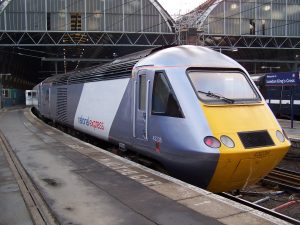Adam Brookes
Liberal Democrat Town Councillor for Market Deeping Learn more
Nationalisation of East Coast franchise would be no magic wand
by Adam Brookes on 1 January, 2018
 With the news of the inability of Virgin Trains East Coast to meet their future commitments to pay the Government for their right to operate services on the East Coast Main Line, nationalisation is again being touted as the solution.
With the news of the inability of Virgin Trains East Coast to meet their future commitments to pay the Government for their right to operate services on the East Coast Main Line, nationalisation is again being touted as the solution.
The inter-city franchise has a rather tortuous history, with GNER, National Express, and now Virgin/Stagecoach failing to meet their obligations.
The period following the failure of National Express when services were run by the Department of Transport’s Directly Operated Railways is frequently hailed as a demonstration of success that nationalisation could bring. We hear about the £1bn that the publicly owned franchise paid.
But private operators, Virgin included, have paid premiums higher than those paid by Directly Operated Railways. In its final year of operation, DOR paid £215.7m premium to the DfT. In the financial year ending March 2017, Virgin paid £272m.
The problem is the way in which the private operators have committed to pay ever increasing premiums through the life of their franchise.
The fundamental question here is why has the Department for Transport, during both Labour and Conservative/Lib Dem coalition governments, repeatedly accepted bids to run the franchise which purport to be able to provide what keeps turning out to be unaffordable premiums. This would appear to be a failure of both public and private elements of the rail industry to properly forecast achievable revenues.
This inability to plan for the future also makes comparisons between time periods for the franchise difficult and we should not jump to conclusions as to what factors have provided favourable performance in particular periods. Just as the premium paid by an operator is not necessary an indicator of overall performance, so can metrics which look at punctuality which can be impacted by various factors outside the operator’s control.
My main point is that rail is very complicated and we should view with extreme scepticism any suggestions that there are easy answers. Or, indeed, that there is only a single answer.
It has been suggested that the failure of Virgin East Coast will cost the taxpayer perhaps billions. Clearly the levels of premium due to be paid to the Government will not now be paid but given the history, it perhaps wasn’t wise to have expected to see all of this money.
Labour’s 2017 manifesto set out their desire to renationalise services but provided little detail on how this would actually deliver an improved network.
Labour believe in greater public ownership, and that is a perfectly acceptable position, but the public are not well served by those who want to use every failure of the present rail system to promote this cause. There are many aspects of the rail system that can be improved without such radical, expensive, and time consuming changes. There is a risk that such opportunities are being missed because the focus by is on renationlisation.
As editor of Peterborough-based Rail magazine Nigel Harris has said, part of the problem is a media that is often ignorant of how the rail system works and there is a need to ensure that the public are better informed.
We need a debate about rail, and transport more broadly, that is focused on outcomes, not ownership structures. Otherwise, as the seemingly inevitable pass the parcel of Government between Labour and the Conservatives continues, we will see continuous restructuring efforts which are more likely to be to the detriment of the public rather than beneficial.
3 Comments
GNER failed as the parent company collapsed (Sea Containers), leaving them nothing and so had to default. Not because of the way the franchise was ran.
Virgin Trains East Coast is failling as Network Rail have failed them in capacity improvements due in 2018/2019 that are late. All the franchise bids were based on the assumption Network Rail would be on-time and meet its commitments. VTEC cannot provide the service level it expected to run by the end of 2018 / beginning of 2019. So VTEC is naturally looking for a re-negotiation to accommodate that.
That leaves National Express, which failed as a result of an ambitious premium profile that didn’t meet actuality – just as the recession hit.
What seems extraordinary to me is that the franchise system is based entirely on bidding these ridiculous future premiums – it never seems to be offered on either a “contract to provide services” or a “divided profits” basis as has worked well in many other European countries to provide competition. DOR was effectively working on a divided profits basis and there is no reason that commercial operators should not be offered the same methodology. Similarly there could be a contract to provide services, similar to what Great Western are currently in.
It seems to me that a Nationalisation is only one of many possible solutions, although looking at the number of overseas state railways that do operate our trains, there is a strong argument for an organisation like DOR to be allowed to bid too. At the very least, the franchises should be created with a revert to “divided profits” clause for when the premium estimates go wrong. This would allow companies a way out of the premiums (but at a reduced profit potential for them) without throwing out the entire operating company with it’s staff, logos, liveries, processes and experience.
Aw, this was a very good post. Taking the time and actual
effort to generate a good article… but what can I say… I put things off a whole lot and never seem to
get nearly anything done.
My homepage cara membuat blog